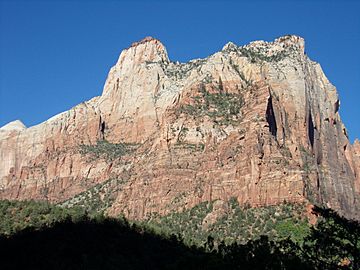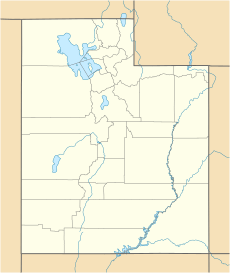The Sentinel (Zion) facts for kids
Quick facts for kids The Sentinel |
|
|---|---|

The Sentinel, northeast aspect
|
|
| Highest point | |
| Elevation | 7,120 ft (2,170 m) |
| Prominence | 400 ft (120 m) |
| Isolation | 0.81 mi (1.30 km) |
| Parent peak | The East Temple |
| Geography | |
| Location | Zion National Park Washington County, Utah United States |
| Parent range | Colorado Plateau |
| Topo map | USGS Springdale East |
| Geology | |
| Age of rock | Jurassic |
| Type of rock | Navajo sandstone |
| Climbing | |
| First ascent | 1938 Bob Brinton, Glen Dawson |
| Easiest route | class 5 climbing |
The Sentinel is a 7,120+ ft (2,170+ m) high mountain peak. It is located in Zion National Park in southwest Utah, United States. This tall rock is made of Navajo Sandstone. It stands near a famous spot called the Court of the Patriarchs. The park map shows its height as 7,157 feet.
About The Sentinel
The Sentinel is about 1.5 miles (2.4 km) north of Zion's main park office. It rises an amazing 3,000 feet (900 meters) above the park road. You can see it towering over the floor of Zion Canyon. The Virgin River flows nearby, collecting water that runs off the mountain.
The Sentinel has many mountain neighbors. These include Bee Hive, Mount Spry, The East Temple, and the Three Patriarchs. The name "The Sentinel" was officially chosen in 1934. This was done by the United States Board on Geographic Names.
The Big Landslide
The Sentinel was once much larger. About 4,800 years ago, a huge rock avalanche happened. This event is called the Sentinel Slide. It moved a massive amount of rock. The slide blocked the Virgin River. This created a large body of water called Sentinel Lake.
Sentinel Lake existed for about 700 years. Over time, it filled up with sand and dirt. This process helped create the flat valley floor you see in Zion today. In 1995, a smaller landslide happened at the base of The Sentinel. This slide also blocked the Virgin River for a short time. It even washed out a part of the park road.
Weather at The Sentinel
The best times to visit The Sentinel are in spring and fall. The area has a Cold semi-arid climate. This means the coldest month usually has an average temperature below 32 °F (0 °C). Also, more than half of the yearly rain falls during spring and summer.
This desert area gets less than 10 inches (250 mm) of rain each year. Snowfall in winter is usually light.
 | Delilah Pierce |
 | Gordon Parks |
 | Augusta Savage |
 | Charles Ethan Porter |



